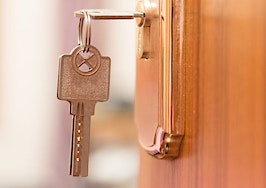How much money do homesellers leave on the table if they sell to Opendoor, the property-exchange platform that’s raised $320 million?
A look at Opendoor’s listings in Las Vegas, the company’s latest market, points toward the answer.
On March 17, Opendoor was trying to sell its Las Vegas listings for an average of 6.13 percent more than it bought them for.
Looking at the data from a seller’s perspective, Opendoor customers sold their homes at an average discount of 5.75 percent off what Opendoor had listed the properties for on March 17. These stats are based on the 11 Las Vegas-area listings that appeared on Opendoor’s website on March 17.
The figures seem to raise the possibility that homeowners can sell their homes to Opendoor for less than they’re worth. Considering that Opendoor charges a service fee of 6 to 12 percent, sellers might end up paying much more than they would if they used a real estate agent.
But then again, a range of variables may sometimes shake out in a way that supports Opendoor’s claim to buy at market value.

Take the example of one home that Opendoor purchased on February 23. The startup bought the property for $322,000 and has since listed it at $345,000.
Let’s say Opendoor sells the home for 4 percent less than its list price, $331,200, and we assume this price is equal to market value.
That would suggest the seller sold to Opendoor at a 2.78 percent discount off market value, equal to $9,200.
Add in the 6.5 percent service fee that Opendoor says it charged this seller ($20,900) and the cost of selling to Opendoor would come out to $30,100, or a little over 9 percent of the home’s market value.
If a real estate agent sold the same property at our presumed market value while charging a 6 percent commission, the seller would have paid only around $20,000.
But a combination of other variables could tilt the cost of Opendoor either up or down, such as closing costs and repair cost credits paid by the seller, and light repairs made by Opendoor.
In our example, Opendoor received a repair cost credit equal to $1,100 from the seller, but then shelled out $2,600 on repairs, nudging up the home’s value, according to Opendoor CEO Wu. He also said Opendoor pays an average of 1.5 to 2 percent in seller concessions when the firm sells a home, including a possible repair cost credit.
Taking all this into account, Opendoor should have only ended up costing the seller a half percentage point more than an agent, Wu said.
Having carved out footholds in Phoenix and Dallas, Opendoor began looking to buy properties in Las Vegas in late 2016, but only made listings searchable on its website last week. It showed a total of 11 Las Vegas listings on March 17.
Opendoor was offering a commission of 2.5 percent to buyer’s agents, which is less than the going rate of 3 percent, according to Todd Miller, broker-owner of Nevada Realty Solutions and the founder of Homing In, a property valuation startup.
“2.5 percent is just asking to not get showings,” Miller said.
But Opendoor has since raised this fee to 3 percent.
“It was literally just a mistake,” Wu said. “We thought 2.5 percent was standard in Vegas, and it’s not.”
Two Opendoor competitors, OfferPad and Knock, recently burst onto the scene with head-turning funding rounds, heralding a push by property-exchange platforms into the industry.
As the dust settles, consumers will emerge with a clearer grasp of their pros and cons, putting their staying power to the test.
Editor’s note: This story has been updated with additional information from Opendoor.












